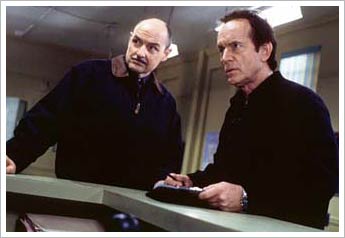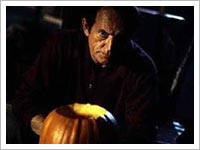By Don Jacobson
A recent story in the Los Angeles Times caught my eye; it said that according to various polls, 40 percent of Americans believe that events leading to the Biblical end times are already under way. These are the end times from the Book of Revelation which will culminate with Jesus roaring down from Heaven to end the reign of the Antichrist at the Battle of Armageddon, in which Satan’s armies will be defeated, Judgment Day will be upon us and all of Jesus’ true followers will finally get their reward for having to endure the endless “persecution” they’re now suffering at the hands of Godless liberals like the editors of the L.A. Times.
That 40 percent of all Americans believe with varying levels of certainty that this is going to happen – even after the disappointment of the millennium coming and going without so much as a single heavenly trumpet – is impressive. It got me to thinking about the religio-scientific dread that the approaching millennium inspired in the late 1990s, when “Y2K” and not “9/11” was the shorthand that inspired widespread fear.
The millennium was feared – yes “feared” is the right word – by people across the social spectrum, from the religious believers who were looking for a big, blazing “end times” message, to survivalists who fled to the woods after stocking up on canned goods and overpriced gas-powered generators, to nervous Wall Street types who demanded that companies spend millions and spell out their Y2K preparations in minutest detail.
Yeah, it all seems pretty silly now. What was there to fear, as it turned out, but our own fevered dreams of supernatural wrath raining down from above? But of course faith is faith, and as such is impervious to such things as reason and history, so nearly half of us still think the gears are turning that will shortly lead to our two-o’clock with the Messiah. It made me realize that the love of religious mysticism is so very deep in “modern” America that it’s time to reassess the ignoble place to which Chris Carter’s Millennium, which ran three seasons on Fox from 1996 to 1999, has been assigned in TV history. Just because it turned out the millennium itself was a bust is no good reason to diss this show’s memory. In fact, with all the people out there still feeling the kind of religious dread in which this show specialized, it might actually be wise for Carter to follow through on his stated desire to finally bring closure to this underrated show in the form of a feature film, sort of a Serenity to Fox’s Firefly.
Twentieth Century Fox released the third and final season of Millennium on DVD last September, so now it’s possible to take a leisurely look back on the whole series arc. What you see is a series that had all of the formidable writing, acting and movie-quality production values of The X-Files, but, unfortunately, none of the consistency. Because Carter was stretched so thin with the X-Files movie and other TV series’ he was working on, Millennium switched directions pretty drastically from season to season as he handed off show responsibilities to different producers in the later years.
So it suffered from not really knowing where it was going. But there was one thing that remained consistent: Lance Henriksen‘s portrayal of serial killer profiler Frank Black. Black was a great character, no two ways about it. He was a combination of an FBI cop, a psychic, a New Age family man, an action hero and a political liberal who fought for victims of the system as well as victims of the killers. His talent was being able to “see” the crimes through the eyes of the perps in these kind of quick-cut, glimpse-of-nastiness flashbacks accompanied by horrific sound effects. But it also drained him because, let’s face it, it’s tough to stomach what a killer feels while he’s going at it. Henriksen made Black all hang-doggy and world-weary, very craggy, often brooding silently under the pressure of the awful burdens he has taken on to protect as all from evil.

And it worked – it was pretty creepy.
In Millennium‘s first season, Carter himself was at the helm. In his original vision, Black’s biggest concern was holding his family together (wife Megan Gallagher and daughter Brittany Tiplady as he tried to cope with his return from a mental breakdown his abilities had caused him earlier while working with the FBI. On leave from the cop shop, he worked as a “consultant” for the Millennium Group, a mysterious cadre of former FBI agents who worked together in a secretive fashion to solve the weirdest and most heinous crimes – it was based on an actual organization called the Academy Group. His contact with the group was Peter Watts (played by Terry O’Quinn, since gone on to massive fame on Lost), who had a habit of paging Black (pre-cellphone
days) with some new horror just when he was on the verge of making some emotionally healing breakthrough with the help of his family.

In that first year, it was mostly about Black tracking down killers; kind of straightforward – but in a strange Chris Carter kind of way. The major storyline was that an unseen killer was stalking Black’s wife and child, sending him Polaroids of them going about their business. Mrs. Black ends up being kidnapped and tortured in a season-ending cliffhanger. She’s rescued to kick off the second season, but it leads to the Blacks’ separation – and it signaled Carter’s separation from the series as its show producer.
It was in Millennium‘s second season, I believe, that it reached its peak, as James Wong and Glen Morgan from The X-Files took over. That’s when the real connection to the millennium’s religious aspects took over, and the Millennium Group morphed into something that resembled an ancient, worldwide cult that traced its roots back to 1000 A.D. They greeted each other with the cryptic phrase, “This is who we are.”
Wong and Morgan spent much of the season giving tantalizing clues as to whether the Millennium Group was trying to hurry or hinder a Christian apocalypse, what role Peter Watts played and chronicling Frank Black’s wavering opinion of the Group as they considered him for membership.
That 1997-98 season should secure Millennium‘s place as a brilliant look at the dark heart of American apocalyptic religious fervor. One episode dealt with a bloody struggle over a chunk of the true cross of the crucifixion ,which believers thought they’d need to have in their possession in order to win the Battle of Armageddon. Another had him meeting the devil himself, in the form of a reclusive neighbor from his own childhood, after reading the Bible on Halloween. A teenage girl is persecuted for channeling Mary Magdalene. Two women’s prison escapees – lesbian lovers – think one’s pregnancy is an immaculate conception. The season wraps with a deadly, Biblical plague sweeping the Northwest, one that might have been engineered by the Millennium Group.
In its final year, with Morgan and Wong departing, Millennium again changed, de-emphasizing the religious dread but building the Millennium Group into a more secular threat that, unfortunately, began to resemble more and more the alien-human conspiracy in The X-Files. Frank Black, with his wife killed in the plague, took on a perky young female FBI agent as a partner (Klea Scott).
I’m not saying these final episodes weren’t also well-written and superbly acted (including a hilarious one that guest starred KISS), strangely enough, not a jump-the-shark moment). But the singular thing that made Millennium great – the Book of Revelation obsession – was now being downplayed. The show petered out in Spring 1999 – only six months short of the actual millennium – due to chronically poor ratings in a Friday night time slot that has never been the launching pad for successful shows.
The fact that this country remains so convinced that Armageddon is only a rebuilt Temple away from happening is, to me, some pretty scary stuff in and of itself. And the genius of Millennium was not so much its depiction of a world of religio-scientific goings-ons happening unnoticed, but the much more frightening fact that these beliefs were becoming mainstream thought – and that we’d need some brooding hero like Frank Black to save us from them.
Don Jacobson last wrote on our TV page about the boneheaded cancellation of Invasion. He also writes frequently with grace and wit in Alt-Country Corner and Chicago In Song.
Posted on June 27, 2006


